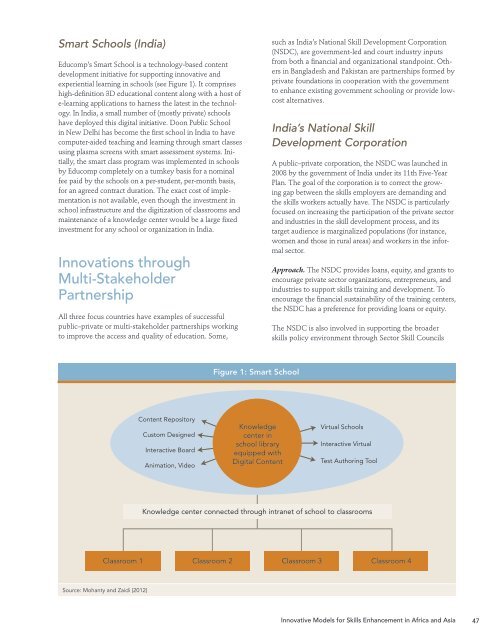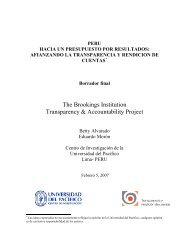Innovative Secondary Education For Skills Enhancement
Innovative Secondary Education For Skills Enhancement
Innovative Secondary Education For Skills Enhancement
Create successful ePaper yourself
Turn your PDF publications into a flip-book with our unique Google optimized e-Paper software.
Smart Schools (India)<br />
Educomp’s Smart School is a technology-based content<br />
development initiative for supporting innovative and<br />
experiential learning in schools (see Figure 1). It comprises<br />
high-definition 3D educational content along with a host of<br />
e-learning applications to harness the latest in the technology.<br />
In India, a small number of (mostly private) schools<br />
have deployed this digital initiative. Doon Public School<br />
in New Delhi has become the first school in India to have<br />
computer-aided teaching and learning through smart classes<br />
using plasma screens with smart assessment systems. Initially,<br />
the smart class program was implemented in schools<br />
by Educomp completely on a turnkey basis for a nominal<br />
fee paid by the schools on a per-student, per-month basis,<br />
for an agreed contract duration. The exact cost of implementation<br />
is not available, even though the investment in<br />
school infrastructure and the digitization of classrooms and<br />
maintenance of a knowledge center would be a large fixed<br />
investment for any school or organization in India.<br />
Innovations through<br />
Multi‐Stakeholder<br />
Partnership<br />
All three focus countries have examples of successful<br />
public–private or multi-stakeholder partnerships working<br />
to improve the access and quality of education. Some,<br />
such as India’s National Skill Development Corporation<br />
(NSDC), are government-led and court industry inputs<br />
from both a financial and organizational standpoint. Others<br />
in Bangladesh and Pakistan are partnerships formed by<br />
private foundations in cooperation with the government<br />
to enhance existing government schooling or provide lowcost<br />
alternatives.<br />
India’s National Skill<br />
Development Corporation<br />
A public–private corporation, the NSDC was launched in<br />
2008 by the government of India under its 11th Five-Year<br />
Plan. The goal of the corporation is to correct the growing<br />
gap between the skills employers are demanding and<br />
the skills workers actually have. The NSDC is particularly<br />
focused on increasing the participation of the private sector<br />
and industries in the skill development process, and its<br />
target audience is marginalized populations (for instance,<br />
women and those in rural areas) and workers in the informal<br />
sector.<br />
Approach. The NSDC provides loans, equity, and grants to<br />
encourage private sector organizations, entrepreneurs, and<br />
industries to support skills training and development. To<br />
encourage the financial sustainability of the training centers,<br />
the NSDC has a preference for providing loans or equity.<br />
The NSDC is also involved in supporting the broader<br />
skills policy environment through Sector Skill Councils<br />
Figure 1: Smart School<br />
Content Repository<br />
Custom Designed<br />
Interactive Board<br />
Animation, Video<br />
Knowledge<br />
center in<br />
school library<br />
equipped with<br />
Digital Content<br />
Virtual Schools<br />
Interactive Virtual<br />
Test Authoring Tool<br />
Knowledge center connected through intranet of school to classrooms<br />
Classroom 1<br />
Classroom 2 Classroom 3 Classroom 4<br />
Source: Mohanty and Zaidi (2012)<br />
<strong>Innovative</strong> Models for <strong>Skills</strong> <strong>Enhancement</strong> in Africa and Asia 47
















